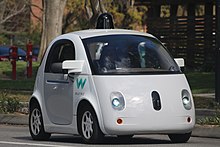User:Mmgal22/sandbox
Driverless Cars:
A driverless or autonomous car is a self-driving car that does not require a human to operate it for it to drive. This new development in information technology allows for these cars to rely on a handful of techniques such as radar and sensors in order for them to know their locations and surroundings. These techniques are what the driverless cars’ control system use to be able to navigate their paths safely. While partially driverless cars are gradually gaining more publicity, companies must consider their potential benefits, as well as the legal, social, and ethical issues behind this fairly new technological development of a fully autonomous car.[1]
Examples:
Primary One: The first popular autonomous car was the Google Car (2010) – a Toyota Prius with a sensor and camera on top – created by Google, Inc. https://www.youtube.com/watch?v=fzduU3XyyqQ
Others: Google created the newest driverless car, called Waymo. Waymo is a fully driverless car that uses sensors and exclusive software to be able to detect pedestrians, other cars, and bike riders. Tesla - the car company - claims that all of their models have the software needed for full self-driving capability.
Here is Waymo's website: https://waymo.com/
Here is Tesla's website: https://www.tesla.com/autopilot

Potential Benefits:
- Reduction in traffic accidents due to the fact that humans are not driving which will eliminate human errors while driving.
- Increase mobility for all: disabled citizens, the elderly, and those unable to drive.
- Faster commute times.
Potential Issues:
- Cyber hacking into the software the car is using. [2]
- Liability concerns- who should be liable for potential accidents (passenger or manufacturer)?
- Possible lawsuits due to malfunctions of the vehicles.
- ^ Fleetwood, Janet. "Public Health, Ethics, and Autonomous Vehicles". American Journal of Public Health. 107 (4): 532–537. doi:10.2105/ajph.2016.303628.
- ^ Mott, Nathaniel (October 2016). "As self-driving cars hit the road, cybersecurity takes a back seat". ProQuest.

